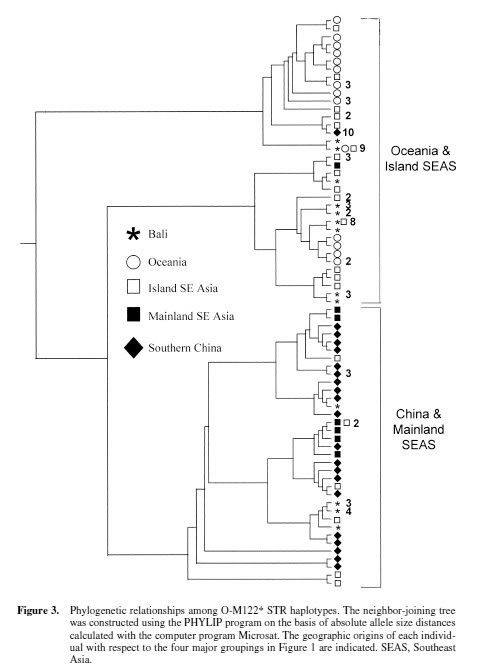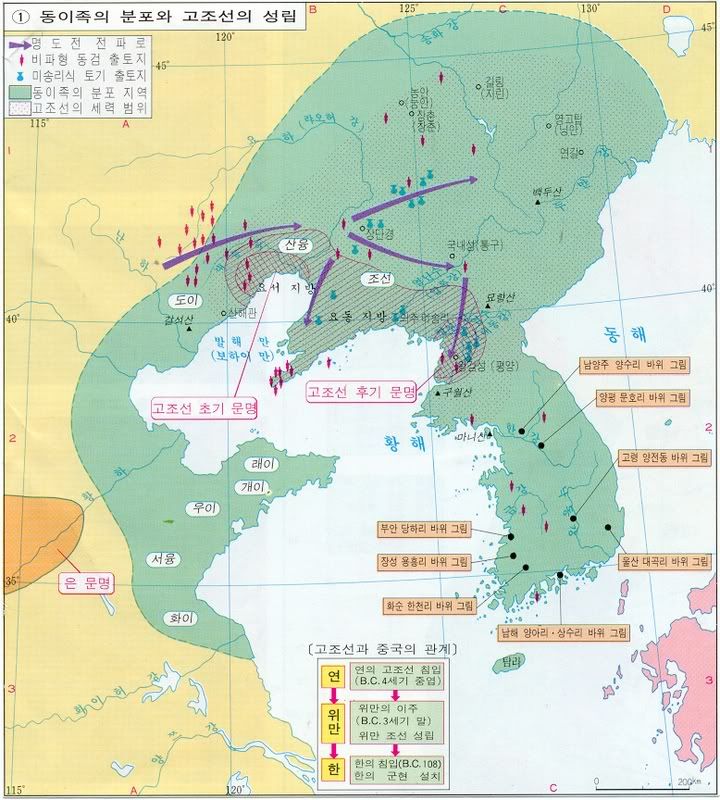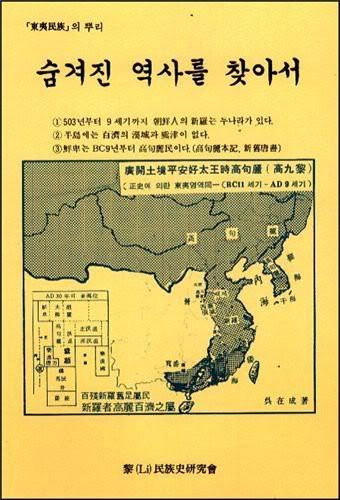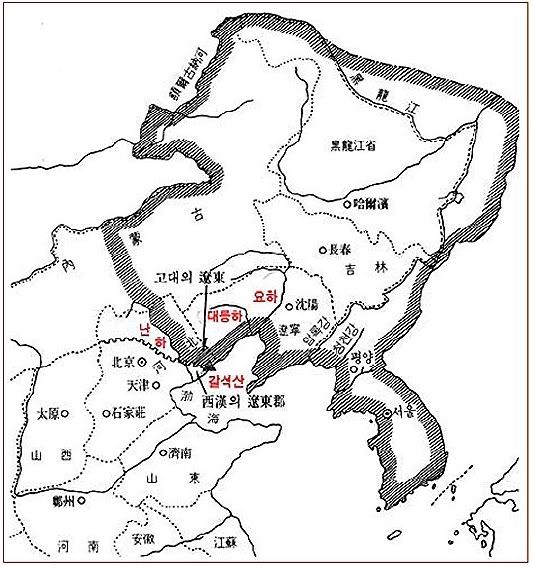Peter wrote:Recently,I saw there is a long debate on subject " who is the real inventor for chinese language" in newsgroups soc.culture.china & soc.culture.korean. below is the msg.
The so-called Chinese character was probably invented and
developed by Korean, although the populous Chinese also have used it as
their basic writing systems. I believe the number of population of any
ethnic group should not be a factor that obscures the origin. I explain some
evidences.
1. The original pictographs called 'gab-gol' (bone and shell) or 'bok-sa' in
Korean were certainly invented during the Yin dynasty (or Shang state, BC
1600~BC 1046), although it is uncertain who was the inventor. There is no
dispute regarding this matter between Korean and Chinese historians. There
are ample recent evidences that the dominant people of the Yin dynasty was
Korean, which some Chinese historians also acknowledge.
2. Among countries that adopted Chinese character, only Koreans use exactly
one syllable for one character. Chinese or Japanese used one or more
syllables for one character. A good example is the sounds denoting the
numbers. Only Koreans use just one syllable for one number. So, it is very
easy for Koreans to say any complex numbers quickly.
For another example, the sound for 'white' in Chinese character in 'baek'
(one syllable) in Korean but 'bai' (two syllable) in Chinese. Regarding the
character denoting 'head', it is 'doo' in Korean but 'tou' in Chinese. On
the other hand, it is the same for the character denoting 'mountain' -
'shan' in both Korean and Chinese.
Why have Koreans used only one syllable for one character, but Chinese one
or more syllables? It certainly shows that Chinese pronunciation system is a
variant from Korean counterpart.
3. Some basic pictographs reflect Korean life-style and customs.
For example, the character denoting 'house' (ga in Korean) contains a
character denoting a pig (hog) in the lower part. In the house, people live,
not a pig live. Why did they adopt a pig to denote a house? Only Koreans
raised pigs within their house.
Another example is the character denoting 'sun'. The character contains a
dot within a rectangle. Why did they contain the dot, seemingly
unnecessarily? The dot denotes a golden crow. Only Koreans had the legend
linking the sun to the golden crow.
Additional example is the character denoting 'surname' (ssi in Korean). In
Chinese, the character denotes only 'surname' while it denotes both
'surname' and 'seed' in Korean. 'Ssi' is a most common word in Korean and
compares the pedigree with the tree (i.e., the seed is a common symbol for
the original ancestor whose trace has been handed down by his surname).
4. Korean history book describes the origin of written systems, which is
inscribed in dolmens in Korea.
A Korean history book called Chun-bu-gyung records the origin of both
current Chinese character and Korean alphabet (hangul). Chinese character is
a kind of pictograph + ideograph, while hangul is the most advanced of
phonogram + ideogram in the world. Bone and shell inscriptions were a
pictograph, while hexagrams of I-ching invented by Fu Xi (Bokhwi in Korean)
are a kind of ideogram. The original character for both Chinese character
and hangul was 'Nok-doo-mun' (the most ancient writing system), according to
the Chun-bu-gyung. Currently, only Koreans still play a game called 'Yout',
which is believed to be very similar to the 'Nok-doo-mun'. The principles of
Yout game are essentially the same as I-Ching. Moreover, in Korea and
Manchuria, currently there are many ancient rocks (dolmen) in which various
kinds of primitive writings are inscribed (see some pictures at
http://myhome.shinbiro.com/~kbyon/culture/rokdo.htm)
Based on these four facts, I strongly argue that the Chinese character was
originated and developed by Koreans. The differences in pronunciation system
for numbers between Chinese and Korean clearly indicates it's Korean origin.
--- Footnote
I add my message on Fu Xi and I-Ching. Fu Xi (or Bokhwi in Korean) is one of
the candidates for the inventor of Chinese characters.
Han and 'I Ching'
The hexagrams of the I Ching were said to have been created by the
legendary emperor 'Fu Xi' after he had contemplated on a diagram
called Ha Do that was bestowed from the Heaven. Han scholars rewrote
many myths as fact to fill gaps in early Chinese history. Fu Xi was
declared to have been the very first emperor, ruling from 2852 to 2737
BC. He was said to have been the inventor of musical instruments and
Chinese handwriting [1].
Chinese legend says that Fu Xi is the most senior one among the three
ancestors. Together with N-Wa, the women who he married with, they
started the civilization of human being. The current Fu Xi's Temple in
Shandong was built on a 6-meter high terrace. In the main hall, Fu
Xi's state was placed and sacrifices are given. And in the back of the
hall, N-Wa's statue was placed [2].
It is said that the upper body of Fu Xi is that of a human being while
his lower body is in the form of a snake. Inferring from the
scientific nature of the I Ching, it may just be possible that Fu Xi
was an extraterrestrial. If Fu Xi was indeed the first ancestor of
Chinese, then how could the descendents describe their first ancestor
as a monster? Why did ancient Chinese historians initially consider Fu
Xi as just a legend? Ancient Chinese call their neighboring people as
"bugs" or"barbarians". The monster portrait suggests that Fu Xi might
have been from a neighboring country, not Chinese countries. What was
that country?
"Fu Xi came from the nationality called East Yi dwelling in the
Neolithic Age, along the coastal area of the present-day Shandong
Province and, therefore, Fu Xi turned out to have come from Shandong
Province" (quoted from a Chinese site [4])
What was "East Yi"? Of course, "Yi" means "barbarians" in Chinese.
Most Koreans know what is "Dong (east) Yi". People in 'East Yi' are
known to have been very good at archery, as Korean Olympic archery
teams are today. The Chinese character "Yi" indeed symbolize the
shape of a big bow. Surprisingly. the recently discovered Korean
history text titled "Han Dan Go Gi" describes the life of "Fu Xi"
(Bokhwi in Korean) [3].
It writes that he was the son of the 5-th emperor of the Baedal
(B.C.3898- BC 2333) and his surname was "Pung" as he lived in
"Pung-san". Although the surname "Pung" no longer exists in Korean
names, some related words survived to today such as "Pung-chae"
"Pung-gol" and"Pung-shin", all of which are terms for describing human
body shape. Another daughter name was "Yeo-wa" (N-Wa in Chinese) [3].
It writes that she was known to have a magical talent to make a human
being from mud and to be extremely jealous (these two points, together
with the sound, might may remind you of Jehovah) [5].
Unfortunately only a few Korean scholars in universities accept "Han
Dan Go Gi" as a history book, insisting that the book was fabricated
in some points. Some Koreans, while acknowledging that a few points
might have been fabricated while copying, decry the university
historians as too much contaminated by Japanese colonial view of
history that tried to disparage Korean history in the 1910-1945
period, as they deny whole text book. Anyway, East Yi was located in
Shandong Province...... What does this mean? I would rather stop here
for today. But the point is that it will not be awkward that I link "I
Ching" to Han.
Some References on this footnote
[1] Microsoft Encarta "Fu Xi"
[2] http://www.china-sd.net/eng/sdtravel/scenery/30.asp
[3]
http://www.sejongnamepia.pe.kr/name_before.html
http://www.shaman.co.kr/newspaper/09/mago.htm
http://www.jsd.or.kr/a/truth_sh/korhist/k_hist_05.htm
[4]
http://www.sbbs.com.cn/English/RE-EXPLO ... 20STONE.ht
m).
[5] http://www.hankooki.com/culture/200205/ ... 516030.htm
[6] http://www.chinaknowledge.de/History/Zh ... autumn.htm
"Later historians said it was intended to protect the original Chinese
states from the intruding barbarian tribes Man ƚ, Rong ??
and Yi ?i"
http://www.xsenergy.com/theme.html
"Yi is known by a variety of names: The East Barbarian, Yi the Good,
Lord Yi, and Yi Lord of the Hsia. As a result of this ambiguity, Yi is
seen both as a hero who is favored by the Gods as well as a villain,
murderer, usurper and adulterer. In this myth Yi is the hero as he
shoots the Ten Suns to avert disaster.
quate from from soc.culture.china
Korean invented chinese language
-
shameforKorea
- Posts: 1
- Joined: Tue Oct 24, 2006 6:56 am
Re: Korean invented chinese language
I bet that you are not a scholar, a scholar will not be so stupid.
-
zhaochenglin
- Posts: 1
- Joined: Sun Oct 29, 2006 7:27 pm
- Location: QEQE
- Contact:
-
yangzi8007
- Posts: 4
- Joined: Wed Oct 25, 2006 5:17 am
-
yangzi8007
- Posts: 4
- Joined: Wed Oct 25, 2006 5:17 am
因为他们的国土小,就幻想着辽东三省是他们的国土;因为他们没有耀人的历史,所以便幻想一千年前就被中国唐朝灭掉的高句丽是他们的历史,而李世宗不过是他们的手下败将;因为他们没有足够悠久的文化,所以继续幻想着中医,针灸,本草纲目,活字印刷术是他们发明的,甚至连汉字也是他们发明的;因为他们没有杰出的人物,所以便幻想confucius(孔子),西施,老子都是韩国人。
韩国狗,有本事就把你们那面“太极四卦”国旗给撤下来啊!你们根本不配拥有那面代有中国文化的旗帜!
koreandog,you make we chinese feel extremely nauseated!
the world has a disgusting race like you korean is a kind of burning shame!
韩国狗,有本事就把你们那面“太极四卦”国旗给撤下来啊!你们根本不配拥有那面代有中国文化的旗帜!
koreandog,you make we chinese feel extremely nauseated!
the world has a disgusting race like you korean is a kind of burning shame!
Any evidences?
So far the response to the topic was highly political and embarassingly emotional from chinese side. let us stick to the original topic, and present concrete evidences whereby we might have rational discussions free of the ranting so often seen in this thread.
(1) Genetic relationship between han chinese and korean. I contend that most chinese are unrelated to korean people, who are mostly of northern nomadic stocks, unlike majority of chinese who are of south east asian stocks.


(2) Dong-Yi was a part of north east china. Much of cultural advancement was conducted in that region, and it is definitely possible that korean, who ruled parts of china then, contributed to the invention of chinese characters. Confucius was born in Shandong peninsula, and it's possible that he had a korean ancestry. If we read confucius alienation from mainstream chinese culture, greedy and hopeless at his time, we can see that he may be of foreign origin, that makes him more or less unique and independent.


(3) Go-joseon was a ruler of north east asia in ancient times. Many of the ancient korean culture, as shown by the dolmens, and pyramids in that region, was lost, and external to the mainstream han chinese civilizations. It is possible that korean might have invented chinese language during that time period, as we all know that china was invaded by northern nomads so often, and occasionally being colonized and enslaved.

(1) Genetic relationship between han chinese and korean. I contend that most chinese are unrelated to korean people, who are mostly of northern nomadic stocks, unlike majority of chinese who are of south east asian stocks.


(2) Dong-Yi was a part of north east china. Much of cultural advancement was conducted in that region, and it is definitely possible that korean, who ruled parts of china then, contributed to the invention of chinese characters. Confucius was born in Shandong peninsula, and it's possible that he had a korean ancestry. If we read confucius alienation from mainstream chinese culture, greedy and hopeless at his time, we can see that he may be of foreign origin, that makes him more or less unique and independent.


(3) Go-joseon was a ruler of north east asia in ancient times. Many of the ancient korean culture, as shown by the dolmens, and pyramids in that region, was lost, and external to the mainstream han chinese civilizations. It is possible that korean might have invented chinese language during that time period, as we all know that china was invaded by northern nomads so often, and occasionally being colonized and enslaved.

- Alex_rcpilot
- Posts: 14
- Joined: Sat Oct 28, 2006 3:25 pm
Curious, what was the language spoken in China before the Koreans "invented" the Chinese language? Or even before there was a Korea?
Why would Chinese people discard their own language back then, and take up this new invention nationwide?
There's no such thing as "inventing" a language.
Languages are generated from the basic social need of communication between human beings.
Languages are inherited. Languages don't change rapidly. There are only a few ways to change the language spoken in a region: colonization, mass nationwide racial slaughter, mass intermarriage. In a word, some great power must force the original race either to EXTINCT, or to give up the original language they inherited from their families.
Given the fact that most Chinese nowadays are unrelated to Korean people, I believe the Chinese didn't extinct at the time Koreans started "inventing" Chinese. I.E, the Koreans didn't take over.
And no evidence of gigantic power as political or military movement on forced language change is found. Hence there would be no reason for the original inhabitants to give up there own language.
So things are simple: ancient Chinese had no reason to take in a language "invented" by other people.
If the Koreans meant their ancestors had "influence" on the developement of the Chinese language, I would agree. As nations interact, they have influence on each other's languages more or less as well.
Anyway I wouldn't shamelessly exaggerate such influence as an invention.
Why would Chinese people discard their own language back then, and take up this new invention nationwide?
There's no such thing as "inventing" a language.
Languages are generated from the basic social need of communication between human beings.
Languages are inherited. Languages don't change rapidly. There are only a few ways to change the language spoken in a region: colonization, mass nationwide racial slaughter, mass intermarriage. In a word, some great power must force the original race either to EXTINCT, or to give up the original language they inherited from their families.
Given the fact that most Chinese nowadays are unrelated to Korean people, I believe the Chinese didn't extinct at the time Koreans started "inventing" Chinese. I.E, the Koreans didn't take over.
And no evidence of gigantic power as political or military movement on forced language change is found. Hence there would be no reason for the original inhabitants to give up there own language.
So things are simple: ancient Chinese had no reason to take in a language "invented" by other people.
If the Koreans meant their ancestors had "influence" on the developement of the Chinese language, I would agree. As nations interact, they have influence on each other's languages more or less as well.
Anyway I wouldn't shamelessly exaggerate such influence as an invention.
Most of the documented history is merely 2000 years ago, and we only have archeology to make an intelligent guess.Alex_rcpilot wrote: And no evidence of gigantic power as political or military movement on forced language change is found. Hence there would be no reason for the original inhabitants to give up there own language.
We have many artefacts remnants in north east asia, where altaic civilizations flourished in ancien times. I think history should be rewritten in some way.
Korean History Chronology

- Alex_rcpilot
- Posts: 14
- Joined: Sat Oct 28, 2006 3:25 pm
I've seen this chronology before, I don't see anything which helps proving the Korean idea.mdavid35 wrote: Most of the documented history is merely 2000 years ago, and we only have archeology to make an intelligent guess.
We have many artefacts remnants in north east asia, where altaic civilizations flourished in ancien times. I think history should be rewritten in some way....
People always complicate things when they go sophistical.
Let me put it simple:
Both Chinese race and Korean race date back to 700,000 years ago, they were almost at the same scratch line. (of course, live finds a way, the lands were interconnected)
They went separate ways as they lived in different regions.
Ever since there was human on this land, there came the need of communication, and there came the language.
Language developes as human itself developes. Several factors help language advancing, one of them is inspiration from other races.
As long as the race continues, their language goes on. Given the fact that the Chinese language had already been started by ancient Chinese, there is no need for them to start using another language from another race.
According to archaeological documentations, there has been translation activities in China ever since Chou. So we can see back then, ancient Chinese people in different regions already started learning and advancing their languages from alien languages. I bet acient Koreans took part in this interactive activities too.
This kind of activities has existed ever since there was human communication. If Koreans are to start such misconception that influencing some race's language can be called inventing it, then they would be hinting that ancient Chinese invented their language too. Because influence is bidirectional.
I think the argument that ancient Koreans invented the Chinese language is the most ridiculous thing I have ever heard. Why the hell would someone bother learning a new language to replace his original?
Prussia once tried to force the French people to give up their own language. Look at how it turned out.
It happend a LOT later than ancient times, I think the French were already much, much more intelligent than ancient Chinese people, so it was much easier for them to learn a foreign language. Besides, Prussia did it by conquering the French land, so they had the power of forcing a nation to do something they didn't want to do.
An example of a race "inventing" a language which is new to a region:
European colonist succeeded in taking over north America. And that changed the language spoken in this region. But who have been speaking this new language since then? White people. What happend to the Indians speaking the old language? They were wiped out!! Would anyone think a race will take over a place, keep the inhabitants, teach them a new language and eventually leave in peace? Come on! Seriously why would they bother? The would stay there, and their gene will be all over this place ever since.
Is Korean gene all over China? No.
Is it possible that ancient Koreans defeated entire China, kept the residenters, taught them this newly invented language, and retreated to Korea in peace? Tell me you believe it. Guys will have a good, surprised look at you.
Were ancient Chinese smart enough to start using a new language nationwide, while being stupid enough to discard their own languge? Yes? Take a breathe, and jump outta the damn window.
You don't know history of korea
I have no time to make a comment on your messages, but I just give you what's the history of korea documented by the careful archealogical studies.
http://en.wikipedia.org/wiki/History_of_Korea
History of Korea
From Wikipedia, the free encyclopedia
Jump to: navigation, search
This article is about the history of Korea, through the division of Korea in 1940s. See History of North Korea and History of South Korea for the post-World War II period. See also Names of Korea.
Amitabha and Eight Great Bodhisattvas, Goryeo scroll from the 1300s.The history of Korea stretches from Lower Paleolithic times to the present.[1] The earliest known Korean pottery dates to around 8000 BC, and the Neolithic period began before 6000 BC, followed by the Bronze Age around 2500 BC. According to the legend, the first dynasty of Gojoseon was founded in 2333 BC, and it eventually stretched from the peninsula to much of Manchuria.[2] By 3rd Century BC, it was in decline and eventually broke apart, producing a multitude of successor states.
In the early Common Era, the Three Kingdoms (Goguryeo, Silla, and Baekje) along with Gaya Confederacy and Buyeo, conquered other successor states of Gojoseon and came to dominate the peninsula and much of Manchuria. They competed with each other and Chinese dynasties both economically and militarily. While Goguryeo and Baekje were more powerful for much of the era, defeating Chinese invasions several times, by the 7th century, Silla's power gradually extended across Korea and it eventually established the first unified state to cover most of Korean peninsula by 676.
This period is often called Unified Silla. Soon after the fall of Goguryeo however, former Goguryeo general Dae Joyeong led a group of Koreans to the eastern Manchuria and founded Balhae (698 AD - 926 AD) as the successor to Goguryeo. After Barhae was defeated in 926, much of its people led by the Crown Prince was absorbed into Goryeo.
Unified Silla itself fell apart in the late 9th century, giving way to the tumultuous Later Three Kingdoms period (892-936), which ended with the establishment of the Goryeo Dynasty. During the Goryeo period, laws were codified, a civil service system was introduced, and Buddhism flourished. In 1238, the Mongolian Empire invaded and after nearly thirty years of war, the two sides signed a peace treaty.
http://en.wikipedia.org/wiki/History_of_Korea
History of Korea
From Wikipedia, the free encyclopedia
Jump to: navigation, search
This article is about the history of Korea, through the division of Korea in 1940s. See History of North Korea and History of South Korea for the post-World War II period. See also Names of Korea.
Amitabha and Eight Great Bodhisattvas, Goryeo scroll from the 1300s.The history of Korea stretches from Lower Paleolithic times to the present.[1] The earliest known Korean pottery dates to around 8000 BC, and the Neolithic period began before 6000 BC, followed by the Bronze Age around 2500 BC. According to the legend, the first dynasty of Gojoseon was founded in 2333 BC, and it eventually stretched from the peninsula to much of Manchuria.[2] By 3rd Century BC, it was in decline and eventually broke apart, producing a multitude of successor states.
In the early Common Era, the Three Kingdoms (Goguryeo, Silla, and Baekje) along with Gaya Confederacy and Buyeo, conquered other successor states of Gojoseon and came to dominate the peninsula and much of Manchuria. They competed with each other and Chinese dynasties both economically and militarily. While Goguryeo and Baekje were more powerful for much of the era, defeating Chinese invasions several times, by the 7th century, Silla's power gradually extended across Korea and it eventually established the first unified state to cover most of Korean peninsula by 676.
This period is often called Unified Silla. Soon after the fall of Goguryeo however, former Goguryeo general Dae Joyeong led a group of Koreans to the eastern Manchuria and founded Balhae (698 AD - 926 AD) as the successor to Goguryeo. After Barhae was defeated in 926, much of its people led by the Crown Prince was absorbed into Goryeo.
Unified Silla itself fell apart in the late 9th century, giving way to the tumultuous Later Three Kingdoms period (892-936), which ended with the establishment of the Goryeo Dynasty. During the Goryeo period, laws were codified, a civil service system was introduced, and Buddhism flourished. In 1238, the Mongolian Empire invaded and after nearly thirty years of war, the two sides signed a peace treaty.